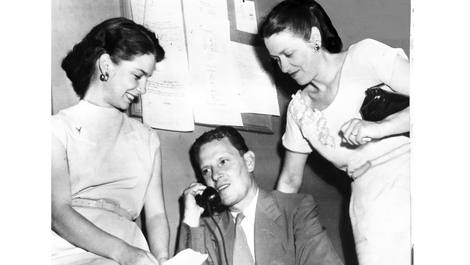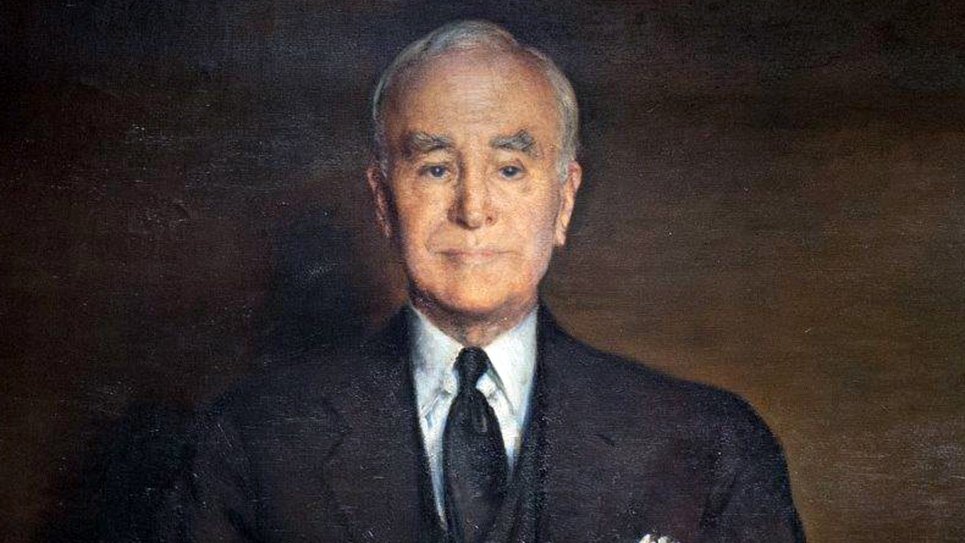
From the author’s personal collection.
Senator-elect Albert Gore receives the news he has been elected Tennessee’s senator. With his wife Pauline and daughter, Nancy, 1952.
By Ray Hill
Albert Gore returned to Washington, D. C. in January of 1953 as a member of the United States Senate after having served fourteen years as a Member of Congress. Gore arrived in the Senate with the reputation of being a giant-killer, having defeated veteran U. S. Senator Kenneth D. McKellar.
Politics in Tennessee had changed dramatically following the 1952 election. It is not an overstatement to say 1952 was the end of an era. Two titans of Tennessee’s political wars had been retired by the voters; Senator K. D. McKellar had been Tennessee’s first popular elected senator, as well as the Volunteer State’s longest serving senator. Gordon Browning had been governor of Tennessee three times, as well as a six term Congressman.
Three men would dominate Tennessee’s politics during the decade of the 1950s: Frank Clement, Estes Kefauver and Albert Gore. Kefauver’s presidential ambitions had already helped to change the face of Tennessee politics. Kefauver had pursued the Democratic presidential nomination before incumbent President Harry Truman had even announced his own intentions. When Kefauver won the New Hampshire primary by beating the little man from Missouri, the President was none too happy. Truman had never especially like Kefauver, but following his humiliation in New Hampshire, the President’s dislike of Senator Kefauver became downright loathing. Truman was hell-bent that Estes Kefauver would not receive the Democratic presidential nomination and nudged a very reluctant Illinois Governor Adlai Stevenson into the race. Southern delegations fought bitterly over the party rules, leaving Governor Gordon Browning at a distinct disadvantage back home. Browning’s loyal support of Kefauver did little to help him in his primary campaign where he was challenged by thirty-two year old Frank Clement.
Both Kefauver and Gore were viewed as “liberal”, while Governor Frank Clement was seen as somewhat more conservative. Both Kefauver and Gore were reviled by many of their constituents, especially in West Tennessee, when they refused to sign the “Southern Manifesto”. That particular document was considered by many Southerners to be a bold declaration of principal decrying racial integration. Only three members of the United States Senate from the South did not sign the Southern Manifesto; Estes Kefauver, Albert Gore, and Senate Majority Leader Lyndon B. Johnson. Johnson may not have even been asked to sign the Manifesto, as southern leaders realized LBJ had a national reputation and aspirations. Johnson had originally won the post as Minority Leader of the United States Senate with the backing of his mentor Georgia Senator Richard B. Russell. Senator Russell was the unofficial leader of the Southern bloc in the Senate.
South Carolina Senator Strom Thurmond, then a Democrat, approached Albert Gore on the floor of the Senate and asked him to sign the Southern Manifesto. Gore blurted out, “Hell no!” Thurmond asked again and Senator Gore gave the same reply.
Gore’s refusal would lead to a challenge inside his own party when he came up for reelection in 1958.
Tennessee clearly had a surfeit of political talent in Tennessee and Governor Clement as well as Senators Kefauver and Gore all harbored some national ambitions. Those conflicting ambitions came into view at the 1956 Democratic National Convention. Clement’s reputation for dazzling oratory won him the coveted spot as keynote speaker at the convention. Senator Kefauver had once again sought the presidential nomination, but faced a much more determined Adlai Stevenson who was prepared to work for the nomination. Kefauver did not fair as well in the preferential primaries that year, but when Stevenson opened the vice presidential nomination to the convention delegates, Kefauver’s heart skipped a beat and he was desperate to be on the ticket.
Estes Kefauver was hardly the only Democrat at the Democratic National Convention whose heart skipped a beat. Several other important Democrats saw them as viable vice presidential nominees, as well as future presidential timber. A young Massachusetts senator named John Fitzgerald Kennedy mounted a strong bid to be on the ticket. The powerful Majority Leader, Lyndon Johnson of Texas entered the vice presidential sweepstakes.
There were three men in Tennessee who also had starry eyes; Governor Clement and Senator Albert Gore saw themselves just as qualified as Senator Kefauver to serve as Vice President of the United States.
LBJ did not want to become an open candidate for the vice presidency and Gore soon won the support of the Texas delegation and that of neighboring Oklahoma. On the first ballot, Gore ran third behind Kefauver and John F. Kennedy. Gore hoped to capitalize on the weaknesses of the two leading candidates; Kefauver was not well liked by many influential Democrats and was unpopular with many of his Senate colleagues. Kennedy was a Catholic, which was not a recommendation in the South especially.
Gore faced problems inside his own Tennessee delegation, which was largely supporting Kefauver. The publisher of the Nashville Tennessean, Silliman Evans, had long hoped to replace the late E. H. Crump, leader of the Shelby County political machine, as the kingmaker in Volunteer State politics. Evans’s newspaper had given powerful support to Gore in his 1952 senatorial campaign and was quite close to Estes Kefauver. Evans reportedly barreled over to Senator Gore and threatened to withdraw the Tennessean’s support in the future. According to some reports, Evans’s threat went even beyond that, with the publisher saying the paper would do its best to beat Gore in future elections.
The pressure on Albert Gore was intense and he saw his small coalition disintegrating. Texas was leaving Gore to support Kennedy in an effort to halt the momentum of Estes Kefauver. Many southerners preferred a Catholic candidate to Kefauver.
Gore sought recognition from the Chair and announced he was withdrawing as a candidate and threw his support to Senator Kefauver. The switch in delegates actually helped Kefauver to narrowly defeat John F. Kennedy.
While Kefauver won a spot on the national ticket, the Democrats were unsuccessful in dislodging popular President Dwight D. Eisenhower. In fact, Kefauver had to be mortally embarrassed by the fact Tennessee went for the Republican ticket, as it did in 1952. Neither Adlai Stevenson nor Estes Kefauver was able to bring along their respective home states in the general election.
Albert Gore was deeply disappointed by his failure to be nominated for vice president and he continued to have national ambitions, but first he had to get reelected to the United States Senate in 1958.
At first, Gore seemed to have no opposition inside the Democratic Party, despite his refusal to sign the Southern Manifesto. The race for governor was entirely a different matter, as it would be the first time since 1944 when an incumbent was not running. A host of candidates entered the gubernatorial primary including Memphis Mayor Edmund Orgill, Judge Andrew “Tip” Taylor, and Buford Ellington, who had been Frank Clement’s campaign manager in 1952 and Commissioner of Agriculture under Governor Clement. Another formidable entrant into the gubernatorial primary was former Governor Prentice Cooper, who had announced his candidacy on New Year’s Day in 1958. Cooper’s statement informed media outlets that he was “the race to win” and for six months, he was actively seeking the Democratic nomination for governor.
Cooper had been Tennessee’s governor for three two-years terms from 1939-45. The Bedford County native had been the first man in almost a century to coax a third term from Tennessee voters. A bachelor during his own administration, the sixty-three year old Prentice Cooper had married a much younger woman and was the father of three small sons. Wealthy, able and highly respected, Prentice Cooper was a formidable candidate.
In June of 1958 both the gubernatorial and senatorial races in Tennessee changed significantly. Prentice Cooper abruptly withdrew as a candidate for governor and announced he was entering the senatorial contest to challenge Albert Gore.
It was a curious decision, as there was only a couple of months before the election and Cooper still enjoyed better name recognition than any of his opponents in the gubernatorial race. Cooper’s campaign for the Senate was pitched to take issue with Albert Gore being too liberal for Tennessee, as well as his failure to sign the Southern Manifesto.
Prentice Cooper’s campaign for the United States Senate was well financed by all appearances and posters began popping up showing the former governor with his attractive young wife and three small boys, urging Tennesseans to support “the Southern way of life”. Billboards materialized all across Tennessee saying Cooper would be “a senator FOR Tennessee, not FROM Tennessee.” Cooper openly campaigned on a segregationist platform, leaving Gore on the defensive.
Gore, as usual had less money, but campaigned feverishly. He taunted the former governor as being a tool of the special interests and a Republican in all but name. While campaigning in West Tennessee, Senator Gore declared he, like most southern senators, had helped to water down the civil rights legislation before Congress to the point where it amounted to little more than allowing everyone the right to vote, a concept he said he supported.
Despite the heavy spending by Prentice Cooper’s campaign, Gore won the primary handily, beating the former governor with almost 60% of the vote. Gore won Davidson, Knox and Shelby Counties, but lost Hamilton County (Chattanooga) to Cooper. The former governor also ran well in much of West Tennessee.
While many celebrated the astonishing victory of the more “moderate” Gore, Buford Ellington, a segregationist, won the gubernatorial nomination. In fact, two of the leading candidates for governor of Tennessee were segregationists and won a total of 414,000 some odd votes over the “moderate” candidates who accumulated roughly 260,000 votes. It is also interesting to note while losing the Senate race decisively, Prentice Cooper won more votes than Buford Ellington. It is interesting to speculate what might have happened had the former governor remained in the gubernatorial contest.
Albert Gore had won a smashing victory to return to Washington for six more years.






